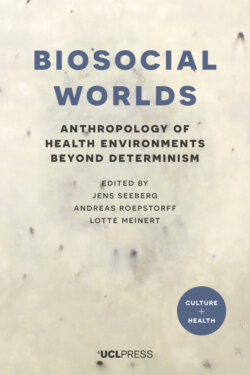Читать книгу Biosocial Worlds - Группа авторов - Страница 8
На сайте Литреса книга снята с продажи.
Notes on contributors
ОглавлениеJulie Livingston is Silver Professor of Social and Cultural Analysis and of History at New York University. She is interested in the body as a moral condition and mode of experience, and taxonomies and the relations that challenge them. Her most recent projects include Self-Devouring Growth: A planetary parable as told from Southern Africa, and Collateral Afterworlds (co-edited with Zoë Wool), a special issue of Social Text. The recipient of numerous awards, in 2013 she was named a MacArthur Fellow.
Margaret Lock is Professor Emerita in the Departments of Anthropology and Social Studies of Medicine at McGill University. Her research focuses on embodiment, epistemologies of medical knowledge, and the global impact of biomedical technologies. She is the author and/or co-editor of 18 books and over 220 articles. Lock is a Fellow of the Royal Society of Canada, Officier de L’Ordre national du Québec, Officer of the Order of Canada, and a Member of the American Academy of Arts and Sciences.
Lotte Meinert is Professor in the Department of Anthropology at Aarhus University. She is the author of Hopes in Friction: Schooling, health, and everyday life in Uganda (Information Age Publishing, 2009), and the co-editor of In the Event: Toward an anthropology of generic moments (Berghahn, 2015), Ethnographies of Youth and Temporality: Time objectified (Temple University Press, 2014), and Time Work: Studies of temporal agency (Berghahn, 2020). Meinert’s current research focuses on marriage, ageing, morality, trauma and time.
David Napier is Professor of Medical Anthropology at University College London and Director of its Science, Medicine and Society Network. He is a founding partner of Cities Changing Diabetes and its Global Academic Lead. Napier has co-authored three UCL–Lancet Commissions, leading the 2014 Lancet Commission on Culture and Health. For his activities with more than 100 charities, he was awarded the first Beacon Fellowship in Public Engagement. He is also the recipient of the Burma Coalition’s Human Rights Award.
Jörg Niewöhner is currently a Professor of Social Anthropology and Human–Environment Relations at Humboldt-Universität zu Berlin, where he also serves as the Director of the Integrative Research Institute on Transformations of Human–Environment Systems (IRI THESys). Over the last 20 years, his ethnographic research has addressed the entanglement of social and ecological thought and practice in health and medicine, and global environmental change and sustainability with a particular focus on questions of knowledge and infrastructure.
Adriana Petryna is the Edmund J. and Louise W. Kahn Term Professor in Anthropology at the University of Pennsylvania. Her work probes expert knowledge and collective survival in crisis contexts, including in the aftermath of nuclear disaster and global health. Her book-in-progress, What is a Horizon? Abrupt climate change and human futures, examines abrupt environmental shifts and challenges of emergency response, particularly to wildfires. She was a Faculty Fellow at Princeton University’s Center for Human Values and is a recent Guggenheim Fellow.
Jens Seeberg is Professor of Anthropology at Aarhus University. His research explores the biosocial dynamics of the development, spread and treatment of multidrug-resistant tuberculosis (TB) in India, and antimicrobial resistance more broadly. He is currently leading an exploration of biotic socialities in a project on ‘people, pigs and bacteria’ in a rural community in Denmark. He has published on TB, inequity in health, private healthcare and medical systems in India. At present, he is writing a monograph entitled Resistances of Tuberculosis, on the biosocial dynamics of patients, TB bacteria and health providers in India.
Mette N. Svendsen is Professor of Medical Anthropology in the Centre for Medical Science and Technology Studies, Department of Public Health, University of Copenhagen. Her research explores ethical and existential dimensions of medical science and technology. She takes a particular interest in how life is perceived and administered in the interface between the laboratory, the clinic, and the public.
Anna Tsing is Distinguished Professor of Anthropology at the University of California, Santa Cruz. She is co-curator of Feral Atlas: The more-than-human Anthropocene (Stanford University Press, to appear in 2020 at https://www.feralatlas.org). She has written and co-edited several books, including Arts of Living on a Damaged Planet (University of Minnesota Press) and The Mushroom at the End of the World: On the possibility of life in capitalist ruins (Princeton University Press).
Susan Reynolds Whyte is Professor at the Department of Anthropology, University of Copenhagen. She carries out research in East Africa on social efforts to secure wellbeing in the face of poverty, disease, conflict, and rapid change. She uses concepts of pragmatism, uncertainty, and temporality to examine relationships between people, institutions, ideas, and things. Her publications deal with the management of misfortune, changing healthcare systems, disability and culture, social lives of medicines, legacies of violence, and the response to HIV and other chronic conditions.
Allan Young is a social anthropologist and Emeritus Professor in the Faculty of Medicine and Arts at McGill University. He has conducted ethnographic research in Ethiopia, Nepal, and the US Veterans Administration. His fieldwork and publications concentrate on indigenous styles of reasoning and technologies. Since the 1990s, his substantive interests have focused on the social history of the diagnosis and management of post-traumatic syndromes, notably war-related post-traumatic stress disorder.
